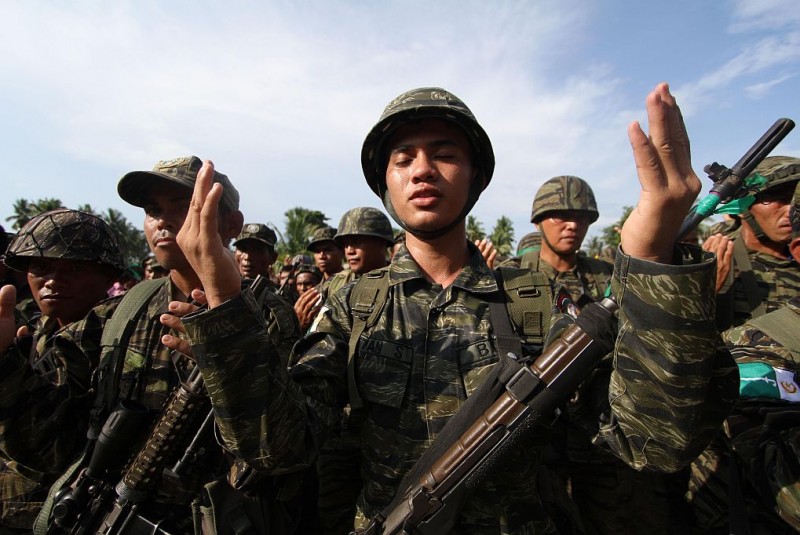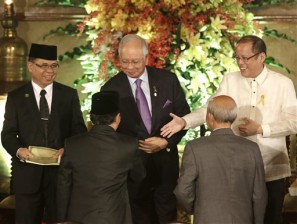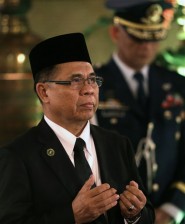Gov’t, MILF seal preliminary peace pact

Members of the Moro Islamic Liberation Front pray together as they gather at their stronghold at Camp Darapanan in Maguindanao province in southern Philippines to coincide with the tentative peace-signing agreement between MILF and the Government at Malacanang Palace. AP PHOTO
MANILA, Philippines- The Philippine government and the leaders of the Moro Islamic Liberation front (MILF) signed Monday at Malacañang Palace a preliminary peace pact aimed at ending decades of fighting in Mindanao.
The agreement was sealed by the government and MILF panels around 3 p.m.
“Today, I extend the hand of friendship to the Filipino people… today we are here to put an end to the adversarial relationship between the Bangsamoro and the Philippine nation. Today it humbles me to say before you, we stayed our course, perseverance has prevailed,” MILF Chief Al Haj Murad Ebrahim said in a speech before the landmark signing of the agreement.
President Benigno Aquino III said the agreement will lead to positive changes and “we now all share the triumph of this agreement.”
“Today we signed an agreement that can finally see, genuine lasting peace in Mindanao,” Aquino said.
“This agreement marks a new chapter in history.”
The agreement was the first major step toward a final settlement that grants minority Muslims in the Mindanao broad autonomy in exchange for ending the violence that has killed tens of thousands of people and crippled development. Many of the rebel leaders interviewed said a lot of work lies ahead in convincing Filipino Muslims to accept a new administrative region.
A product of 15 years of negotiations facilitated by neighboring Malaysia, which wants stability on its doorstep, the agreement sets in motion a roadmap to a final document that the MILF and Aquino’s government plan to clinch before his six-year terms ends in 2016.
The signing was witnessed by Aquino, Malaysian Prime Minister Najib Razak and rebel chairman Al Haj Murad Ebrahim, who will set foot for the first time in Manila’s Malacañang presidential palace, where officials prepared a red-carpet welcome.

1997
Peace talks with the Moro Islamic Liberation Front (MILF) begin, months after the government signs a peace accord with the Nur Misuari-led Moro National Liberation Front (MNLF).
Describing the deal as “a chance to restore dignity” to Mindanao, the Malaysian leader vowed to support the pact: “We will stand with you to make this agreement work.”
“I congratulate all who made this possible,” Razak said.
But Razak warned that the deal “will not save a life unless all parties stand on the principles on which this agreement rests.”
“All those involved in Framework Agreement laid foundations for an enduring peace Framework Agreement does not solve all problems; it sets parameters for peace, restores dignity to people of south,” he said. |
“This marks beginning of era in Southern Philippines. I look forward to the final agreement. After decades, peace is within reach,” he said.
The 13-page document outlines general agreements on major issues, including the extent of power, revenues and territory granted for a new Muslim autonomous region to be called Bangsamoro.
It calls for the establishment of a 15-member Transition Commission to draft a law creating the new Muslim-administered region. The 11,000-strong rebel army will be deactivated gradually “beyond use,” the agreement says, without specifying a timetable.
‘Moro question’
Murad reminded everyone of the root of the Moro rebellion.
“Never in my wildest dream since I was a child, or when I joined the Bangsamoro struggle more than 40 years ago, that one day I will see the interior of this building (Malacañang) that once housed the Spanish and American governors-general, and now the Presidents of the Philippines,” said Murad.
Explaining his presence at the seat of power of the Christian-dominated country, he said he was mandated by the Bangsamoro people to “witness a historic agreement” for a “just and enduring peace in the Bangsamoro homeland.”
Murad cited almost five centuries of foreign domination that gave birth to the “Moro question.”
In one sentence, Murad summed up the historical context of the Moro struggle for self-rule.
“We have seen the loss of our traditional Moro sultanate, the starvation of our sovereignty as a free Moro nation, and consequently our relegation into a state of captivity that eradicated our Bangsamoro identity, and reduced our ancestral homeland into small parcels of gerrymandered territories called provinces,” he said.
This, he said, “led to the marginalization our people within a larger dominant Philippine society that verily took cognizant, if at all, of our forebears and unbroken struggle for freedom even before the Philippine republic saw the light of the day in 1898 and 1946.”
Murad said this “unjust condition” sustained the Moro conflict since the 1970s, giving rise to the MNLF and later MILF, and the 1976 Tripoli Agreement and 1996 Jakarta Agreement.

Malaysian Prime Minister Najib Razak, center in back row, and Philippine President Benigno Aquino III, right in back row, congratulate Moro Islamic Liberation Front (MILF) chief negotiator Mohagher Iqbal, following a signing ceremony for a tentative peace agreement between the MILF and the government which Malaysia helped broker, at Malacanang Palace. Others are Malaysian peace broker Tengku Abdul Ghafar, right back to camera, and MILF chair Al Haj Murad. AP PHOTO
However, he said that Salamat had decided to “engage in peaceful negotiations” in 1997, believing that a “negotiated political settlement is the most civilized and practical way to solve the Moro problem.”
Despite the devastating offensives by the government in 2000, 2003 and 2008–which displayed close to a million internally-displaced persons in strife-torn provinces in the south–the MILF “continued to pursue (peace talks) with unflinching determination and great personal sacrifice despite tremendous pressures from some restive quarters of our Moro populace … and provocation of forces hostile to the Bangsamoro cause.”
“Today … we have stayed the course. Our perseverance has prevailed over those whose position is to perpetuate war and conflict in Mindanao and Sulu for personal aggrandizement,” said Murad, noting 16 years of peace table negotiations resulted in a peace accord.
Dismantling the oppressive system
In response, the President understood that many had resorted to “the path of vengeance and violence,” but he vowed to dismantle the culture of impunity in the country.
“I myself lost my father to an oppressive system; I myself thirsted for justice, and was deprived of it then by the dictatorship. I empathize with our Bangsamoro brothers and sisters, and can only vow to work as hard as I can to see that the culture of impunity is dismantled, and that the foundations of righteousness and cooperation are laid,” he said.
“We will give our people what is truly due them: a chance to direct their lives towards advancement in a democratic, peaceful, and safe society,” he added.
The President claimed that the agreement did not only mark a new chapter in the country’s history.
“It now defines the very path we take as a people—one where opinions are heard and hope is shared; where understanding and consensus breed meaningful solutions for all stakeholders; one where every child is offered the opportunity to shape his own destiny,” said Aquino.
He again thanked Najib and his countrymen “whose commitment to our peace process shone as a beacon of peace to the international community,” and Tengku Dato’ Ab Ghafar Tengku Mohamed, the Malaysian facilitator of the talks, “whose wisdom and experience served as a bridge towards mutual understanding.”
He also expressed gratitude to Deles and Leonen, for working tirelessly with their counterparts from the MILF, and exercised “great patience in the face of probing inquiry—from me especially,” and the governors of the ARMM provinces for supporting the agreement, to wit:
Acting ARMM Governor Mujiv Hataman, and Governors Jum Akbar of Basilan, Mamintal Adiong Jr. of Lanao del Sur, Toto Mangudadatu of Maguindanao, Abdusakur Tan of Sulu, and Sadikul Sahali of Tawi-Tawi.
‘Partner’ for peace
Referring to Iqbal, the President said the MILF chief negotiator kept an open mind which enabled compromise without sacrificing the interests of the Bangsamoro people.
“Of course, I must also express my gratitude to Chairman Murad Al Haj Ibrahim of MILF, whose very able and genuine leadership provided us with a partner who, even while striving for the aspirations of the Bangsamoro people, remained an astute statesman who realized that progress lay in building consensus among the many stakeholders in the region.

Muslim students gather at a square in Cotabatto city in southern Philippines in support of the tentative peace-signing agreement between the government and the Moro Islamic Liberation Front at Malacanang Palace in Manila, Philippines, Monday. AP PHOTO
“He led not with dogmatism or hardened ideology, but with a flexibility and open mindedness borne of trust. We all owe him our collective thanks,” said Aquino of Murad.
Unfinished work
He did not finish his speech without issuing a challenge to the panels tasked to complete the annexes of the agreement.
“Much work remains to be done in order to fully reap the fruits of this framework agreement. We have commitments to fulfill, people to lead, and dreams to achieve. The details to be laid out in the annexes, in particular, provide us with a solid opportunity to expand the common ground whose principles we have already articulated through the agreement,” said the President.
He wanted to help the MILF transform itself into a genuine political party that can help facilitate the region’s transition towards a truly peaceful and progressive place.
“The Filipino people share this victory with you. Together, we move forward with a conviction to lift each other, so that in turn, our nation may grow and reach greater heights. We implore God, or Allah, to continue guiding all of us, so that our dreams may turn into concrete, tangible realities,” he said.
Mere piece of paper
The chief negotiator of the MILF conceded that the framework agreement was a mere piece of paper unless it would be fully implemented on the ground.
Both panels from the government and the MILF are holding formal exploratory talks in November in Kuala Lumpur to tackle the annexes on wealth, power-sharing and normalization of the agreement, and the touchy issue of decommissioning MILF’s forces.
“Let me tell you that no doubt the framework agreement on the Bangsamoro is the best possible peace pact that can be signed by the parties. Pushing them too far will be like asking them to tread the pathways of independence or send them to the brink of war,’’ Iqbal told reporters after signing the agreement with government chief negotiator Leonen in Malacañang.
Iqbal said that if this “seed sown on the ground’’ were nurtured “wholeheartedly and creatively’’ by the government and the MILF, it would “grow and grow until real peace, justice, and development in Mindanao would happen.’’
While it was historic and substantive, the framework agreement that serves as a blueprint for a final agreement that will set up an autonomous Moro homeland was still a “piece of paper,’’ Iqbal said in the joint briefing with Leonen at the New Executive Building.
“It will not implement itself. It requires the sincere intervention of the parties to the negotiation and the all-out support and proper leverage of the friends of the peace process — both local and international –and, without saying, members of the media before we can ensure that this agreement will be fully implemented,’’ he said.
Leonen, responding to this, agreed that it was only a framework agreement but it contained the roadmap to the final peace agreement.
“It is a paper that enumerates the political commitments of the Government of the Republic (of the Philippines) to the Moro Islamic Liberation Front and what it creates is not something that is exclusive to the MILF. It will create a new Bangsamoro Basic Law that will create the Bangsamoro which is the regional arrangement that we will have down south,’’ he said.
Leonen said both panels would begin exploratory talks on the annexes in November in the hope of crafting a final agreement “before the end of the year.’’
“The President wanted an agreement early enough so that it can be implemented, so that it can be assessed, so that in the next administration it is a legacy that can be improved,’’ Leonen said.
Iqbal declined to discuss his expectations of the future discussion on the annexes of power and wealth-sharing and normalization. He said these were still being “negotiated.’’
“You know, I do not want to pre-empt the result of the technical working groups who are negotiating on the details of power and wealth sharing,’’ he said, when further pressed on the details.
The issue of decommissioning MILF forces would also be tackled at the exploratory talks, Iqbal said.
“We have to discuss that. We will present our position. The government will have to present their counter position and let us see what will happen,’’ he said.
Relatedly, under the agreement, the Armed Forces of the Philippines would turn over its law enforcement functions to a reformed police force, Leonen said.
“There is something in the agreement which might assist in terms of determining the form and the function and the relationships of the policing in the area and that is called the Independent Review Commission,’’ he said.
The commission, composed of representatives and experts, would examine best practices in reforming the police, Leonen said.
“I hope that there is no doubt, there is no security vacuum that is going to be left. That is not the intention of the GPH (government of the Philippines) and I would like to believe that the MILF, too, does not intend that the agreement will cause any security vacuum in that particular area,’’ he said.
Now that the engagement with the government has reached a more complex level, Iqbal admitted that it would be difficult for the Moro rebels to proceed.
“They are used to fighting; they are not used to governance. So it would be very difficult for us. But with the help of the friends from the peace process, and international community, we have to empower our people,’’ he said.
On the government side, Leonen said the challenge lay with bringing the matter to Congress and the local government units every step of the way, and explaining it before the international community.
Reaching out to Misuari
Iqbal confirmed that the MILF was reaching out to various leaders of the Moro National Liberation Front after its chair Nur Misuari ranted about the agreement.
“We are negotiating for the entire Bangsamoro people not just for the MILF. And, if you look at the Framework Agreement, the direct role of the MILF is only in the transition and after that it’s free for all,’’ he said.
Leonen said the Transition Commission would include members of the MNLF. Iqbal said it has a shortlist of the eight-man team to the commission, but declined to identify those in the shortlist.
“He’s not joining,’’ Iqbal said when asked if it was wise to include Misuari in the list. “He denounced the agreement.’’
Iqbal said the toughest part of the negotiations pertained to “policing.’’ Leonen said all aspects of the negotiations were tough.
“ In the whole day of Oct. 6, there was no plenary session except the opening and maybe the third reading of the whole document. It was all—the most contentious is about policing. We were about to give up if not for the perseverance of both parties and the creativity of the Malaysian facilitator. It was 10:40 in the evening when we had a deal,’’ Iqbal said.
Both parties said neither the breakaway faction of the MILF, the Bangsamoro Islamic Freedom Fighters (BIFF), nor Misuari was a cause for worry.
“You know, when we finally find the real solution or the real medicine all the sufferings will fade away,’’ Iqbal said. He said there was a mechanism to address the BIFF problem. With a report from AP
